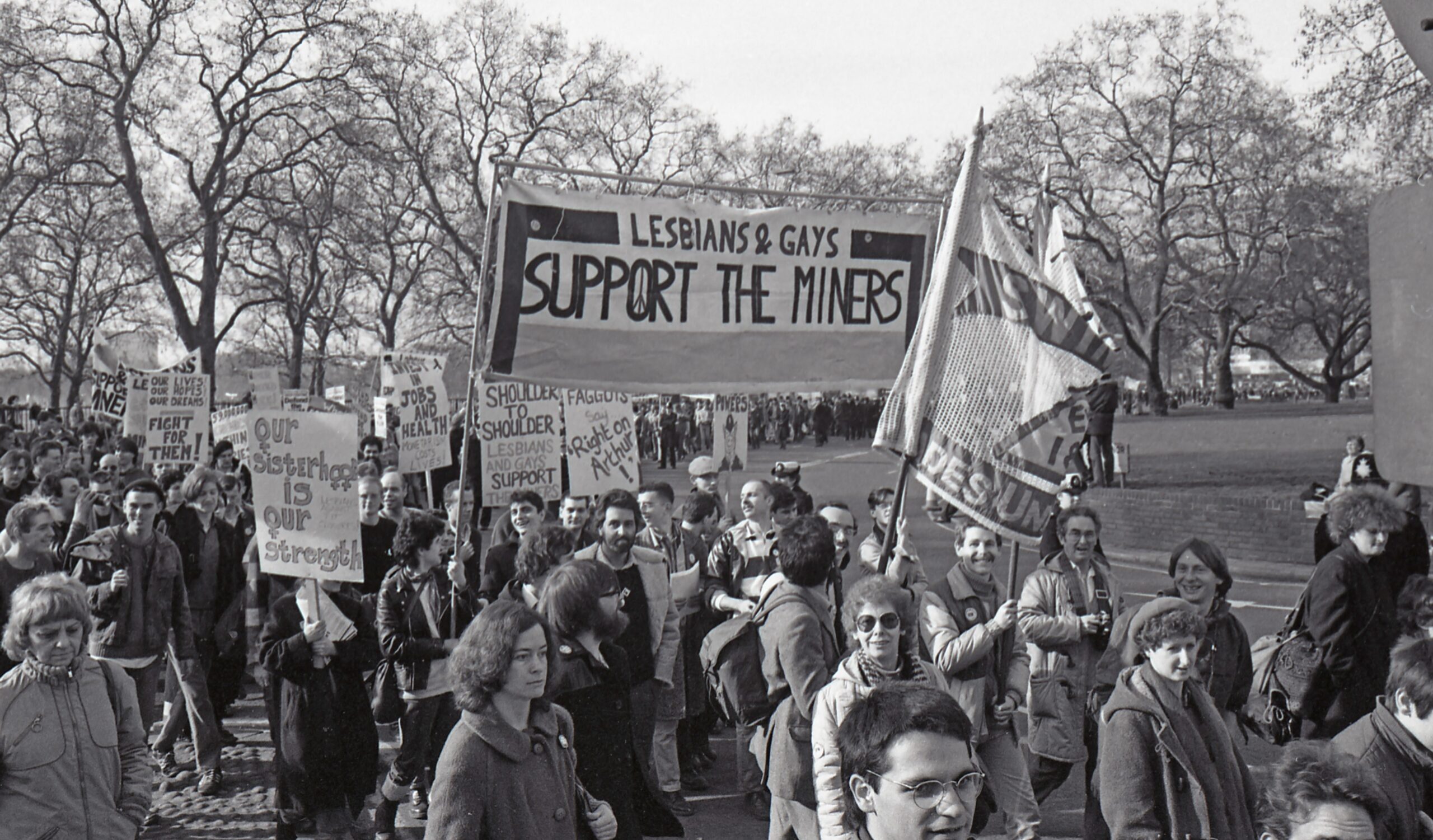By Ray Goodspeed, original LGSM member 1984-85 and Left Horizons supporter
During this 40th anniversary year of the of the great miners’ strike of 1984-85, there are many specific events of those times that can also be marked. The anniversary of the bucket collection for the miners that took place on the London Pride march was 30 June. Lesbians and Gays Support the Miners (LGSM) was formally founded on 15 July 1984.
Left Horizons publishes (see below) a short history of LGSM, which I wrote back in 2019.
LGSM’s solidarity campaign, and the solidarity shown by mining communities in return, has become widely celebrated. To some degree it has helped to inspire a new generation of young people, particularly after the movie “Pride” was released in 2014, loosely based on the true story.
A recent emotional commemorative event in London’s Electric Ballroom saw 1,500 mainly younger people, mostly from the LGBT community, cheering on a Port Talbot steel worker as well as showing wider solidarity for campaigns supporting migrants, and for the people of Gaza.
The defeat of the strike was devastating for the mining communities, and it cast a shadow over the labour and trade union movement for decades. It is only relatively recently that we have again seen an upsurge in widespread trade union militancy in the health service, the rail industry, the post office, schools and universities and many other sectors as working-class organisations are fighting back.
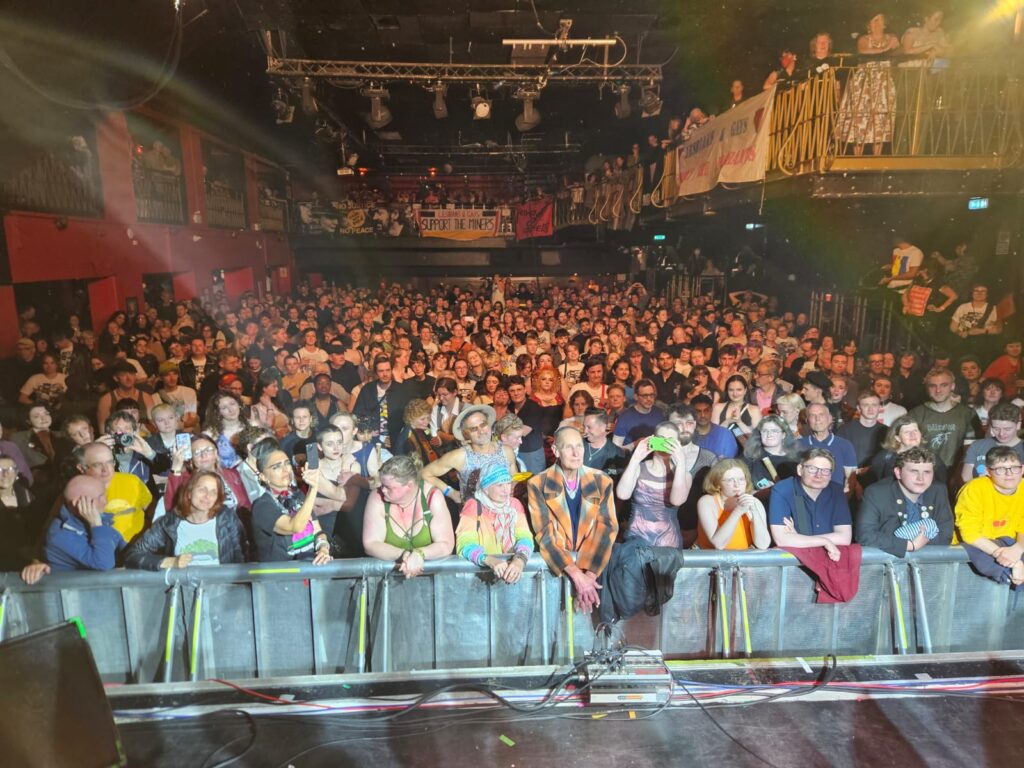
“Pits and Perverts”
40th Anniversary Ball – 16 May 2024
[Photo – Ray Goodspeed]
Since the dark days of the late 1980s, with their demonisation during the AIDS panic and the passing of Section 28, LGBT people have made huge advances in securing their legal rights to equality, though more remains to be done.
However, over the past few years a moral panic regarding trans people has been whipped up by the conservative far right, sadly assisted by some who call themselves feminists or even socialists. The labour and trade union movement needs to stand in solidarity again with trans and non-binary workers, to fight against these bigoted attempts to divide us. The battle is not over!
The article below is an abridged and slightly edited version of a chapter in the book – Shafted: The Media, the Miners’ Strike, and the Aftermath [Campaign for Press and Broadcasting Freedom North, ed. Granville Williams – 2019]. The featured photo is from the LGSM archive.
**********
In 1984, a simple act of solidarity – collecting money for striking miners in buckets at the Lesbian and Gay Pride march on 30th June – would lead to a world-famous solidarity campaign, one which still inspires a whole new generation today.
Since early March 1984, collections had been held on most high streets up and down the country. Many Lesbian and Gay (L and G) people took part in these, but not always openly. Following the march, on July 15, Mark Ashton called the first meeting of Lesbians and Gays Support the Miners’ (LGSM) at his council flat. The aim was simply to extend the principle of the existing collections into the L and G community.
Eleven turned up, all men, and a mixture of Communists and Trotskyists, plus some of their friends and others. Later, less-politically committed young gay men and some lesbians joined, as well as other L and G campaigners. Most were in their 20s or early 30s. Many were from a working-class background themselves, who had come to London from all over the UK. However, others just saw a direct link between the attacks of the Tories, police, media and the Establishment on L and G people, and the attacks on the mining communities.
The group was for Lesbians or Gay men who wanted to support the striking miners and their communities; it had no other purpose. It did not set out to win support for L and G rights in the mining communities. The support was unconditional and was focused on single-issue, practical solidarity action, which kept the many different political tendencies united.
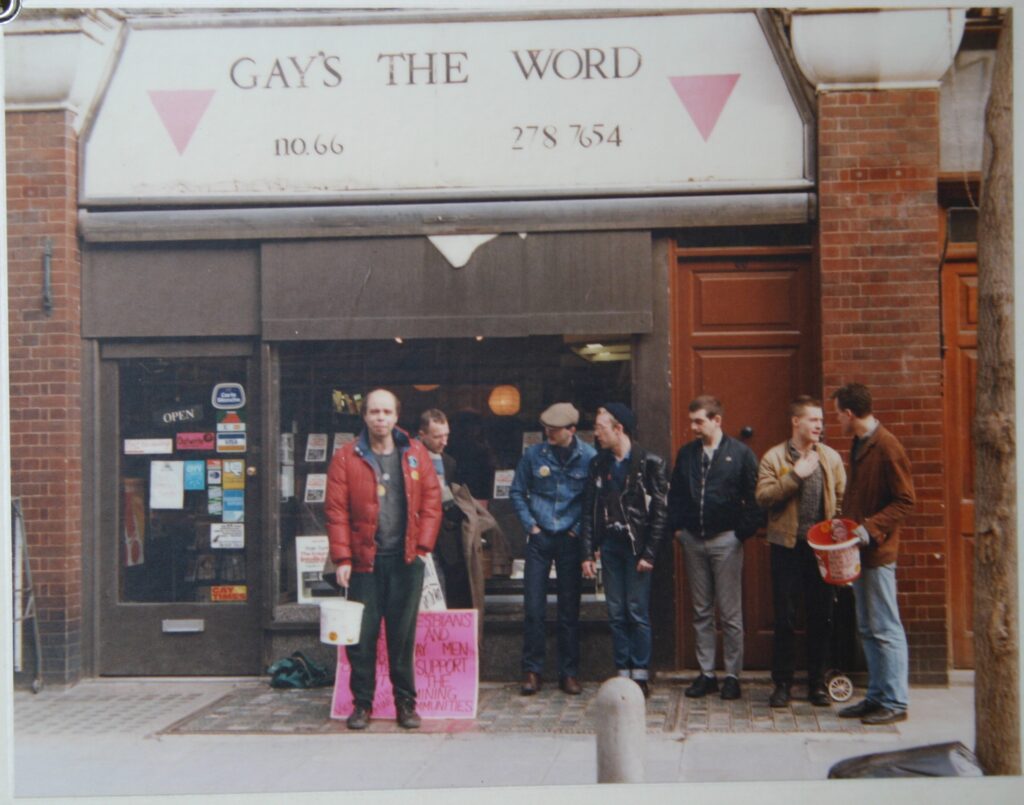
It met every Sunday. Of course, there was no texting, mobiles, email or Facebook back then, so we had to sit there, often on the floor, until everything was sorted out. Thirty-odd people would generally turn up, sometimes over fifty! LGSM sent speakers to meetings and rallies throughout the country and groups were set up in other cities, such as Manchester, Edinburgh, Leicester and Southampton.
We collected at gay pubs and clubs all over London, and the smaller number of Lesbian venues, as well as outside Gay’s the Word bookshop. We took the issues of the strike, in animated discussions, beyond the usual L and G activists and right into the heart of the more commercial scene, from leather bars to drag pubs and everything between.
The question was simple – “which side are you on?”
Most people were supportive, though some gay Tories would loudly oppose us and support Thatcher. Others did not see the miners as a natural ally of gay people and had to be persuaded of the importance of the strike. Some had very bad memories about growing up in mining areas, while others from those areas gave support to the miners from a sense of class solidarity. LGSM became a well-known and popular part of the L and G scene in London. The community was polarised, like the nation as a whole. The question was simply – “Which side are you on?”
A link had already been made with the Swansea, Neath and Dulais Valleys Miners’ Support Group in South Wales. This already had a wide basis of support in its own area, raising money for food, which was distributed, in an impressive operation of military efficiency, to over 900 miners’ households in small villages throughout the valleys. But it was always vital to find other sources of support and finance. Money could not go to the NUM, as Thatcher had seized its funds and the auditors were hunting them down.
On September 6, three LGSM members met Dai Donovan from Dulais. Later that evening, the disco at the Bell pub was halted and Dai had the daunting task of making his first speech in a gay pub. His sincere thanks were greeted by loud applause and another generous collection.
The next Sunday, miners spoke at the LGSM meeting, and stunned us by inviting us to visit Dulais. It was not unusual for the Dulais support group to invite supporters from other areas to visit. But inviting a group of London-based homosexuals to visit, in the social conditions of the early 1980s, was a moving act of solidarity that had profound consequences.
Prejudice was widespread in the labour movement in those days
The 1980s were a time of discriminatory laws; routine police harassment; the absence of any protection from the threat of being fired; and family law that deprived Lesbians and Gay men of their own children. In the media and often in daily life, homosexuals were seen as ridiculous, dangerous, disgusting and mentally ill – and after your children. Growing up in such an atmosphere was painful, and to be ‘open’ was to invite ridicule and violence.
In the Labour movement prejudice was widespread. The Labour Campaign for Gay Rights (LCGR) were doing patient and determined work and some trade unions had mostly informal groups trying to change union policy. But the majority of unions, and the national Labour Party, had yet to be won to a policy of support for Lesbian and Gay rights. Even the biggest far left group, Militant, which controlled the Labour Party Young Socialists, was completely dismissive of L and G issues.
On Friday, October 26, LGSM members, 27 of us in three minibuses, nervously set out to visit Dulais. On Saturday evening, the welfare hall in Onllwyn filled with hundreds of people from the local community. After we were announced, there was widespread and sustained applause. It was a marvellous feeling. An evening of lamb stew, a male voice choir, bingo and dancing followed. So did various conversations during which it actually became clear just how similar we were rather than how different.
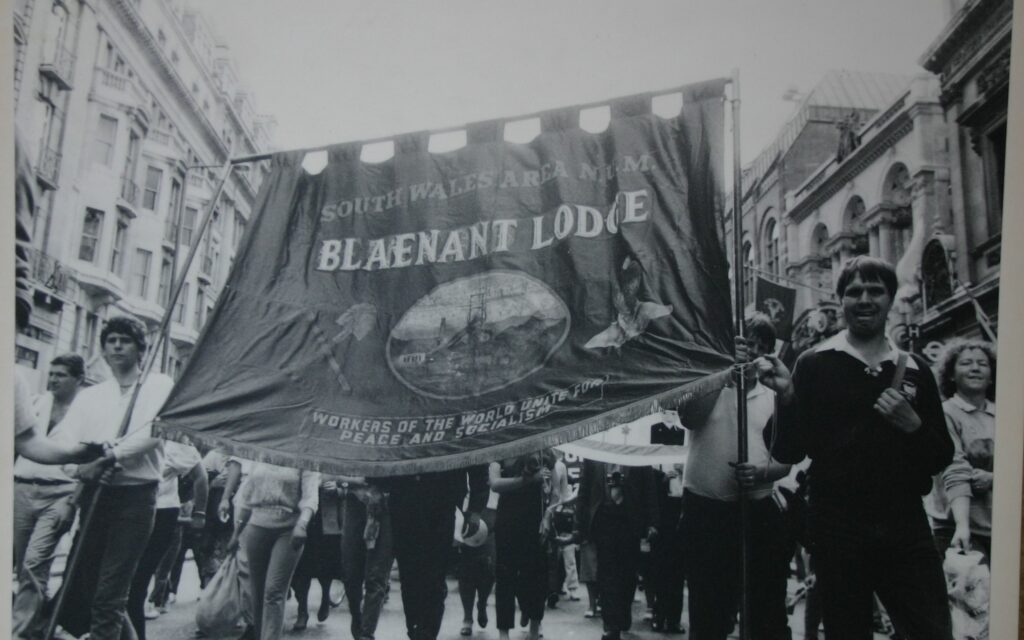
For many LGSM members, this response was deeply moving and inspiring, one that many of us would not have expected in our own home towns. Mike Jackson has often said that it felt like coming home, as young Gay and Lesbian people were welcomed into the heart of a traditional working-class community. That was the beginning of a warm relationship, that has endured for decades, and left its mark on both communities.
Returning home fired-up, LGSM organised the now legendary “Pits and Perverts” Ball (a typically cheeky reclaiming of a term of abuse), on December 10, 1984, at the Electric Ballroom in Camden. A long list of performers was drawn up, and Bronksi Beat, who had just become huge international stars, agreed to headline. Admission was free to striking miners and many attended. It was a huge success.
Grim determination in the coalfields
Speeches from miners and women from different mining communities, as well as LGSM itself, were delivered between the acts. Most memorably, Dai Donovan said, “You have worn our badge, ‘Coal not Dole’ and you know what harassment means, as we do. Now we will pin your badge on us; we will support you”. £5,000 was raised. A large chunk of this money was spent on a bright red van, and the committee in Wales decided, in another amazing act of solidarity, to paint the doors announcing that it had been donated by LGSM.
In early December, some women members formed a new, women-only organisation, Lesbians Against Pit Closures (echoing other the Women Against Pit Closures groups), which twinned with a pit in Nottinghamshire. Some women continued to work in LGSM and others worked with both groups. LGSM sent a letter respecting their decision and offering support.
Early 1985 was a time of grim determination in the coalfields, as desperate poverty and relentless government and media pressure took its toll, and after the hope of other unions coming out on strike had been dashed, but the Swansea, Neath and Dulais area stayed solid.
A public meeting was held in Lambeth Town Hall on January 17, attended by 100-150 L and G people. A cheque for £1000 was presented to a striking miner who spoke. A short film “Dancing in Dulais” was made to record our work and our relationship with the mining community for posterity.
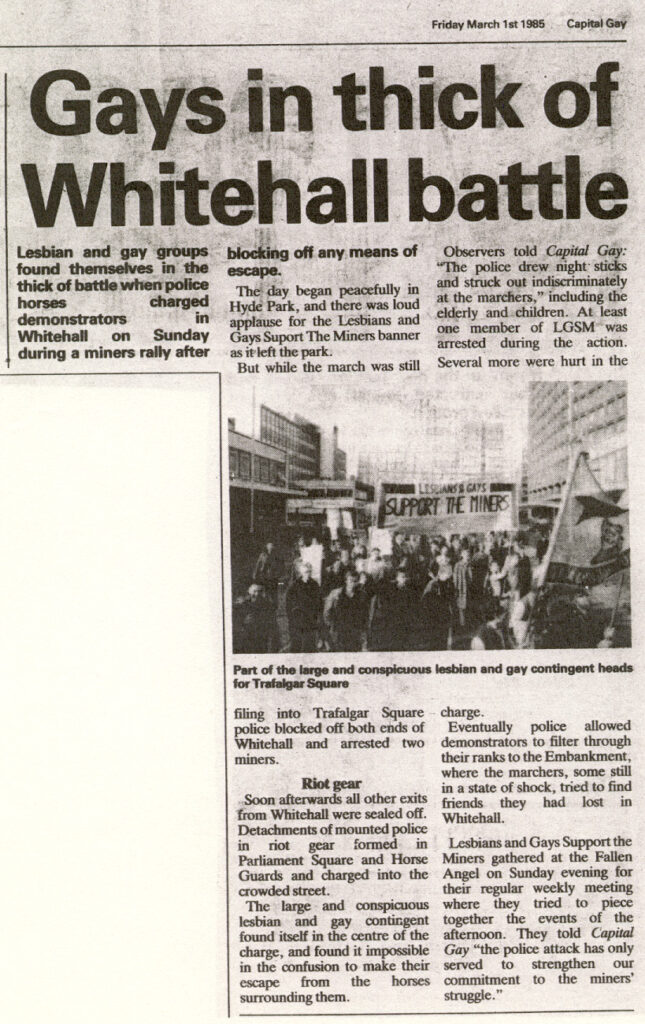
At the massive trade union demonstration to support the miners, on February 24, LGSM members were caught up in a violent mounted police action in Whitehall to intimidate and break up the march. One of our members was arrested and fined. That evening, a shell-shocked LGSM issue a statement – “This police attack has only served to strengthen our commitment to the miners’ struggle.” One week later, the strike was over.
LGSM members were in Dulais when the strike was called off – with no settlement and no guarantees for victimised or sacked miners. We witnessed the distress, the crushing disappointment and the passionate debate and recriminations. We had spent months saying, “If the miners’ lose, we all lose!” but the true enormity of the defeat only became clear over successive months and years, as the Thatcher government’s assault on working class people continued and the left were marginalised.
The Gay community were to suffer from the criminal neglect of the government in the face of the AIDS crisis and the new waves of discrimination that it unleashed. Several LGSM members were lost over the years to HIV/AIDS, including Mark Ashton himself. Section 28 was introduced to halt the progress towards social acceptability for “homosexuals” and their “pretended” families.
The NUM supported gay rights at TUC Congress
The final meeting of LGSM was June 21, 1985, but there was one more triumph. LGSM had invited our friends from South Wales to join us at the 1985 Pride March on June 29, with their banner. It was an astonishing and deeply moving sight. Such a gesture of solidarity from (mainly) straight trade unionists had never happened before, and the crowds on the march could barely believe their eyes. A bit of history was made.
Later that year, at Congress in September, and for the first time, NUM support helped the TUC pass a ‘gay rights’ motion, and again at Labour Party conference in October, building on the work of LCGR, and against the advice of the leadership. This led to the legal reforms finally achieved under Labour Governments after 1997, but even before that, it helped to establish L and G (later LGBT) people as an integral part of the trade union movement and to fight for their rights at work and in wider society.
“Pride”- the movie
In 2011, a scriptwriter, Stephen Beresford, made contact and proposed making a film loosely based on interviews with the original activists in London and in Wales, a fictionalised “comedy/drama”, aimed at bringing the story to the largest possible audience. It was a risk, but we accepted it.
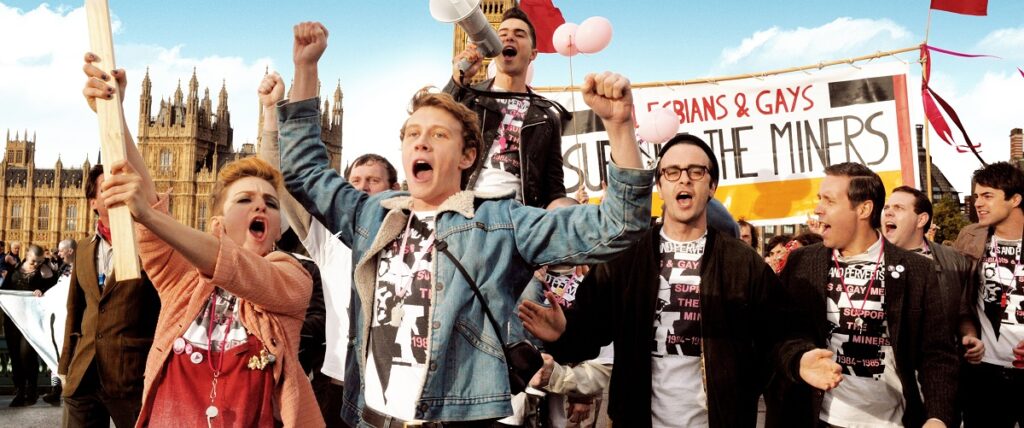
His 2014 movie “Pride” was a hit all over the world, and catapulted LGSM into the limelight. We had no input into the final script or plot, and the differences between the film and historical reality are clear, but both the LGSM veterans and those from Wales enthusiastically embraced it, as it captured the essence and the main political points of our collective story.
Members of both groups helped to promote the film and have responded to countless requests for speakers in connection with the movie and the true story, both in Britain and internationally. For a year, LGSM led almost every Pride march in towns and cities across the UK. At the London Pride march we received a welcome normally reserved for World Cup champions as we led a trade union contingent, together with actors from the film and many of our new young supporters, through the West End.
Money raised from sales of merchandise has been donated to mining, trade union or related causes, especially the Orgreave Truth and Justice Campaign, with whom LGSM has close links. We are a regular feature at the Durham Miners Gala.
The politics of LGSM/Pride have inspired and motivated an entirely new layer of young activists, both socialist and LGBT (or both!) interested in the links between sexual politics and ideas of class struggle. The labour movement is waking up after decades of defeat and retreat, radicalising a new generation. LGSM’s message of workers’ unity, class-politics, and solidarity live on!

